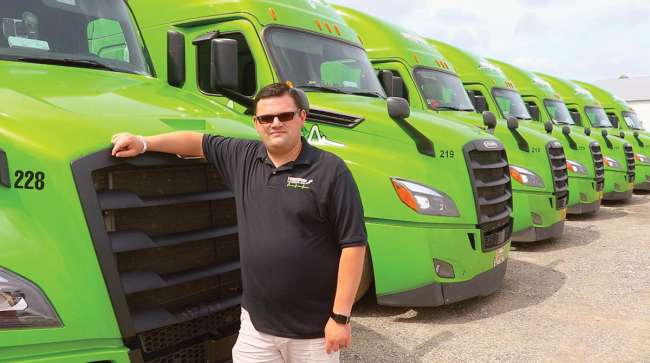Contributing Writer
Truck Financiers Offer Flexibility During Pandemic

[Ensure you have all the info you need in these unprecedented times. Subscribe now.]
Like many other carriers, Bowerman Trucking in Searcy, Ark., has experienced challenges during the COVID-19 pandemic, but one group has made things easier: its creditors.
CEO Matt Bowerman said his company’s tractor manufacturer, Daimler Trucks North America, along with the banks, have been accommodating while deferring his payments.
“We have found that some equipment financing relationships have been more willing to be flexible with this than others, but overall we haven’t had any that just basically said, ‘You’re on your own,’ ” he said.
The 70 trucks in Bowerman’s dry van fleet haul mostly food and food-related products. Given the relatively consistent demand in that business sector, Bowerman Trucking has been able to weather the economic downturn. However, it hasn’t escaped unscathed. In September, the carrier completed a major conversion to newer trucks. Because of that, Bowerman Trucking is financing many power units at once.
Daimler Truck Financial, the captive finance provider for Freightliner Trucks, Western Star, Thomas Built Buses and Mitsubishi Fuso, is working with existing customers based on their specific needs, Vice President Tobias Waldeck said.

Waldeck
“We have provided a lot of assistance with restructures through payment relief, and we are ready to support our customers’ specific circumstances as much as we can,” he said.
The company on May 21 announced its “Keep the World Moving” program, which allows purchasers of 2021 model year Freightliner and Western Star trucks, and purchasers of used trucks, to delay their first payments for 90 days.
Customers who buy 2020 and older units can defer the first payment for up to 120 days as long as they make a down payment, with the amount depending on the make and model.
Waldeck said some fleet orders have been postponed as a result of the pandemic.

In addition to an "International Care," program, Navistar is offering free access to its International 360 service communication and remote diagnostics tool.
(International Trucks)
Meanwhile, Daimler Truck Financial has changed some of its business procedures. The company reduced in-person truck sales meetings by allowing dealers to accept e-signatures, and it is launching a new electronic payment platform that will reduce some fees.
Waldeck said fewer lenders are underwriting used trucks these days, but Daimler Truck Financial is still doing so. He noted dealers have an increased supply of used vehicles, which means they are depreciating while they are parked, but the company believes used trucks still have good value.
The company made changes to its processes in that portion of market as well. Auctions have moved from the physical to the virtual. Waldeck said auction customers like to interact with trucks, so the company has tried to help them become more comfortable with the products.
DTNA’s leasing policies haven’t changed as a result of the pandemic. However, the pandemic has forced it to delay the rollout of its Dynamic Lease Program by three months until the first quarter of 2021. That program, first announced at the 2019 North American Commercial Vehicle Show, is based on a pay-as-you-drive model using telematics data to match payments with miles driven. The company believes the program will appeal to customers at a time when truck usage is dropping.
Flexible Financing Amid Pandemic
Other truck manufacturers also are working with their fleet customers during this unprecedented time. Bill McMenamin, Navistar’s president of financial services and treasurer, said his company’s fleet financing vehicle, Bank of Montreal-owned Navistar Capital, has deferred payments on an as-needed basis. The arrangement improves participating fleets’ liquidity, but the interest continues to accrue. McMenamin said fleets seeking help generally request a 60- to 90-day deferral.
The pandemic is affecting all fleets, most of them negatively, particularly those serving sectors such as oil and gas, manufacturing supply chain and retail delivery, he said. Fleets’ accounts receivables are stressed as they are stretching their accounts payables.
“Many fleets have chosen to redirect trucks to new routes and regions, without any certainty to the longevity or profitability of those operational changes,” McMenamin said. “Many have been forced to rely more heavily on brokered freight and spot rates, impacting overall profit margins. Driver retention continues to face stress as drivers look to avoid ‘hot’ regions for COVID-19, as well as changing government programs.”
Navistar also established its “International Cares” program in response to the pandemic. The program, available through Navistar Capital, features no payments for six months and was available through May 31. It also is offering free access to its International 360 service communication and remote diagnostics tool until Oct. 1, and it is offering its “Worry-Free Vehicle Coverage” program free for up to nine months or 100,000 miles.
“We’re in the business of selling trucks over a very, very long period of time, so it’s in our best interest to make sure that we come up with programs that are effective for both our dealers, our end customers both in the short and long term, and also that build relationships that will bridge to the economy that comes in the post-COVID-19, stay-at-home environment,” McMenamin said.
Navistar has experienced the financing environment both as a lender and a borrower. McMenamin said the company ended the first quarter with $1 billion in cash and equivalents, which would be a good position normally. But with reduced revenue from trucks and parts sales and the overall uncertainty about the duration of the pandemic, the manufacturer sought a $500 million debt offering and ultimately raised $600 million. The money will help the company prepare for a possible post-pandemic recession and will fund strategic projects and upcoming expenses.
McMenamin said Navistar’s funding efforts were aided by its status as an essential business that continued producing trucks during the pandemic, though it had to explain that reality to investors. The legal and regulatory environment also was conducive to raising money. And there was another unusual factor involved.
“It was different that we raised it from working in my bedroom,” he said with a laugh.
Tom Guse, president of Mack Financial Services, said the company is providing payment assistance to many customers and is promoting new offers to help customers that are in the market for trucks.
Guse said his fleet customers have been affected by the pandemic in different ways depending on their products hauled, lanes and freight sources. Those that rely on the spot market have been hit harder than those with long-term contracts with shippers. Some fleets are eliminating or reducing team drivers and slip seating (rotating drivers through available trucks) to reduce the chance of transmitting the virus.
“It doesn’t matter whether you operate one truck or 100, every customer is important to MFS,” he said. “When the coronavirus pandemic began to disrupt the transportation industry, MFS immediately responded to customer inquiries for relief and offered assistance with their loans and leases. At the same time, MFS has been proactive in communicating with customers through digital marketing, social media and our corporate website to let them know we are here to assist with their unique needs.”

(Volvo Trucks)
Stephen Yonce, vice president of truck financial services at Volvo Financial Services, said his company is providing payment assistance to customers of all sizes, including fleets, private carriers and owner-operators. It also is promoting several finance offers.
“As the COVID-19 situation began impacting the trucking industry, VFS immediately responded to our customers and their requests for payment relief,” he said.
As for leasing arrangements, Yonce said the company is seeing a mix of lease returns and extensions for those customers nearing the end of an existing lease.
Paccar Financial declined to comment for this story.
Want more news? Listen to today's daily briefing:
Subscribe: Apple Podcasts | Spotify | Amazon Alexa | Google Assistant | More




